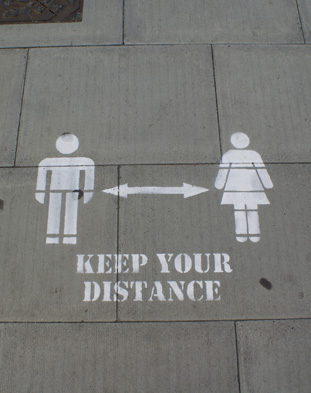Key workers rated themselves as being less compliant to the lockdown regulations compared to non-key workers. An explanation for this could be that key workers were more likely to be unable to work from home and have more interactions with the public. That’s among the findings of a study of public perceptions of covid-19 laws and guidelines.
The Institute of Criminal Justice Studies at the University of Portsmouth found that when asked to rate how well they had complied with the first lockdown on a five-point scale (with one – not well at all, and five – very well), the average was 4.49. This compared to only 2.40 when asked to indicate how well they felt the general population had complied.
Dr Rob Inkpen, Reader in Geography at Portsmouth, says: “Data for this project is being collected over a nine-month period, which is allowing us to witness change over time. Participants believe they had been significantly more compliant than others in the UK general population. Those furthest from the respondents’ own social environment were seen to be the least compliant… Family was seen as most compliant, followed by friends, people in their neighbourhood, and finally people in the UK general population. This latter group were perceived as not being compliant with the lockdown regulations.”
The restriction that was most abided to, was to not attend social gatherings. Social distancing was the restriction least complied with. Researchers concluded that this could be because of the difficulty of practising social distancing sometimes.
Camille Ilett, a researcher at Portsmouth says, “analysis of the survey identified contrasts in how respondents reported problems with compliance within their local area, depending on how they reported their own compliance. Those with high compliance scores were more likely to report problems with adherence to the rules, whereas respondents with lower scores were less likely to believe there had been problems.”
Participants did not expect their behaviour and compliance level to change in further lockdowns but the research team are about to launch a second survey to find out. Dr Sarah Charman, Reader in Criminology is leading the research. She suggests compliance and attitudes towards authority might be linked; ‘those responding with low compliance scores may feel a disregard for authority or the belief that the restrictions are unnecessary’.
The more anxious people were about catching COVID-19, the higher their self-reported scores of compliance and future compliance were. Similarly, the more people were afraid of catching covid-19, the more they estimated that people in their local area were not abiding well to lockdown restrictions. Participants who reported they trusted the police ‘completely’ to be fair and transparent in enforcing covid-19 laws and restrictions were significantly more likely to also report that they fully complied with lockdown restrictions.









